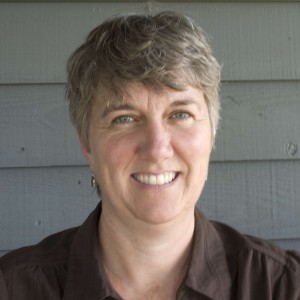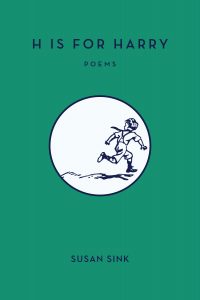 Susan Sink is a poet and writer living on 80 acres in Saint Joseph, Minnesota. She is the author of the volume of poetry, The Way of All the Earth; a collection of 100-word stories, Habits; and The Art of the Saint John’s Bible. She is the administrator at the Episcopal House of Prayer and was a 2005-06 Collegeville Institute resident scholar. Betsy Johnson-Miller recently interviewed her about her most recent volume of poetry, H is for Harry. You can read more of her work at her blog.
Susan Sink is a poet and writer living on 80 acres in Saint Joseph, Minnesota. She is the author of the volume of poetry, The Way of All the Earth; a collection of 100-word stories, Habits; and The Art of the Saint John’s Bible. She is the administrator at the Episcopal House of Prayer and was a 2005-06 Collegeville Institute resident scholar. Betsy Johnson-Miller recently interviewed her about her most recent volume of poetry, H is for Harry. You can read more of her work at her blog.
You dedicate H Is for Harry to your mother, “who taught [you] every letter and showed [you] the world they made.” Can you contextualize that dedication more for us?
The title poem, “H is for Harry,” is about my mother teaching me to read using a comic series in the newspaper. Another story my mother tells is that I learned to speak before I could walk. She’d carry me around and I’d say: “Whassat!” and she’d tell me the word and I’d repeat it back to her.
It was interesting to me to look back at my three books and see the dedications. I didn’t plan it this way but my first book of poetry, The Way of All the Earth is dedicated to my sister, who I felt was my first audience—the one I was writing poems for. The second, Habits, 100-word stories/poems about nuns, is dedicated to my maternal grandmother, who would have been so happy I returned to the Catholic Church as an adult. And this one to my mother. This is the great line of storytellers in my family. I definitely learned how to construct and tell stories from my mother, and my sister has the same sharp memory for striking details and vivid storytelling.
 Many of your poems deal with the world and with geographical location. What is your relationship to place, and why do those seem to matter so much to your writing?
Many of your poems deal with the world and with geographical location. What is your relationship to place, and why do those seem to matter so much to your writing?
I moved a lot before landing in Central Minnesota. In my “poetry life,” I went to New York for graduate school, and then on to California, where I was a Stegner Fellow at Stanford. The two places were so diametrically opposed for me. I felt alienated by California. I guess in some ways I felt I didn’t belong in New York, either, though the poets who were there were the ones who formed me and who I identify with the most.
There are two poems in the book that show my relationship with East and West Coast: “Atlantic,” about going to the Jersey Shore every summer as a kid, and “Pacific,” about Northern California. I’m very interested in America, as a place and an idea. This book is the book of my explorations of America. But now I am home. I remember a friend saying to me when he visited me in Northern California: “You have to get back to the Midwest. The Midwest is your muse.” That made so much sense to me. Moving to Minnesota, I felt like: “These are my trees! This is my landscape! These are my people!”
What does your writing process look like?
Some memory, some phrase, some image, comes to me, and I know it will be a poem. But once I’ve jotted it down and written it out, then the real work happens. I put time into shaping it and crafting it and it changes in that process. Hopefully I get somewhere I didn’t know I was going or reveal what first drew me to that initial impulse in a way that surprises me. I have lots of drafts of things that haven’t quite gotten there yet. So some of my writing process is revisiting things I’ve written before. For example, I found the 9/11 poem “Collapse” in a folder when I was putting the manuscript together. I had completely forgotten about it. I wrote it back in 2003. I don’t think I ever considered it finished, but suddenly it fit with the story of my divorce and with other poems in the book. I wonder what else is lost in those folders.
 My process is also quite different since I decided to put poems in my blog and online at cowbird.com. I stopped submitting to magazines and gave up on poetry manuscript contests. I took the publishing of my poetry into my own hands when I self-published the first book, though I did go to a publisher, North Star Press in St. Cloud, for H is for Harry. I didn’t want to lose poems in those folders. I wanted to share them with people who wanted to read them and also construct an online place for a body of work, not individual poems here and there over years and years. So I don’t work on poems as long anymore before I make them public. I put a lot of the 100-word-story/poems from Habits on cowbird.com. But they are often very different in the final manuscript. I kept working on them, but I put them out there in early versions. It was the same with this manuscript.
My process is also quite different since I decided to put poems in my blog and online at cowbird.com. I stopped submitting to magazines and gave up on poetry manuscript contests. I took the publishing of my poetry into my own hands when I self-published the first book, though I did go to a publisher, North Star Press in St. Cloud, for H is for Harry. I didn’t want to lose poems in those folders. I wanted to share them with people who wanted to read them and also construct an online place for a body of work, not individual poems here and there over years and years. So I don’t work on poems as long anymore before I make them public. I put a lot of the 100-word-story/poems from Habits on cowbird.com. But they are often very different in the final manuscript. I kept working on them, but I put them out there in early versions. It was the same with this manuscript.
In February 2016 I received a diagnosis of Stage IV ovarian cancer. In the early weeks of treatment, I would wake up in the middle of the night, not scared but wide awake, and write poems. I have kept a diary and blogged all these months, and poems kept coming in with the prose. I was grateful to have the blog and the practice of sharing what I was writing as I was writing so I could put that story out there as well.
Poetry is often about incident and personal observation, and yet a variety of characters populate your poems—family members, monks, two husbands. How do you think about the relationship between characters and poetry? Are distinctions between poetry and fiction, and even non-fiction, blurred when you write about others?
Denise Levertov, one of my teachers at Stanford, said she didn’t understand why I wanted to be a poet since my primary interest was human relationships (i.e., not nature). I think of this book as being poetry and lyric prose, because many of the pieces aren’t written in lines and stanzas, but they aren’t exactly prose poems either. They use dialogue as well as the logic and tools of prose, and their power is in the characters or narrative.
The book Habits, whose only form was that each one was exactly 100 words, began to blur the line for me between poetry and prose. I’ve let go of form somewhat– though there is a sonnet, a villanelle, and a sestina in the book and I still enjoy writing in stanzas and lines. I am primarily a storyteller, a narrative poet. There are pieces that want to be expressed in line and stanzas, but there are stories I want to tell using paragraphs and sentences.
Many argue that—like God—poetry is dead (or at least going extinct). Yet, you continue to write poetry. Why?
People were saying that poetry is dead in the 1980s when I was just starting to write seriously. And I remember the moment I learned that living people were writing poetry—a major revelation. I was a freshman at Grinnell College and a friend had a copy of Poetry magazine and wanted my opinion on a poem (actually, it was the same friend who later said the Midwest was my muse). Then, later that year, Howard Nemerov came to campus. I was awestruck.
I don’t feel I was “born” a poet—I envy those who have great natural talent. I had to practice it as a craft, and write hundreds of drafts of poems, and read with real concentration to learn what poets were doing. While I have written in other genres (a memoir and I’m working on a second novel as well as blogging regularly), poetry is a way of seeing, a way of using language to convey states of being and, hopefully, connect more deeply with one’s own inner life and with others’ experience.
Like this post? Subscribe to have new posts sent to you by email the same day they are posted.



Leave a Reply